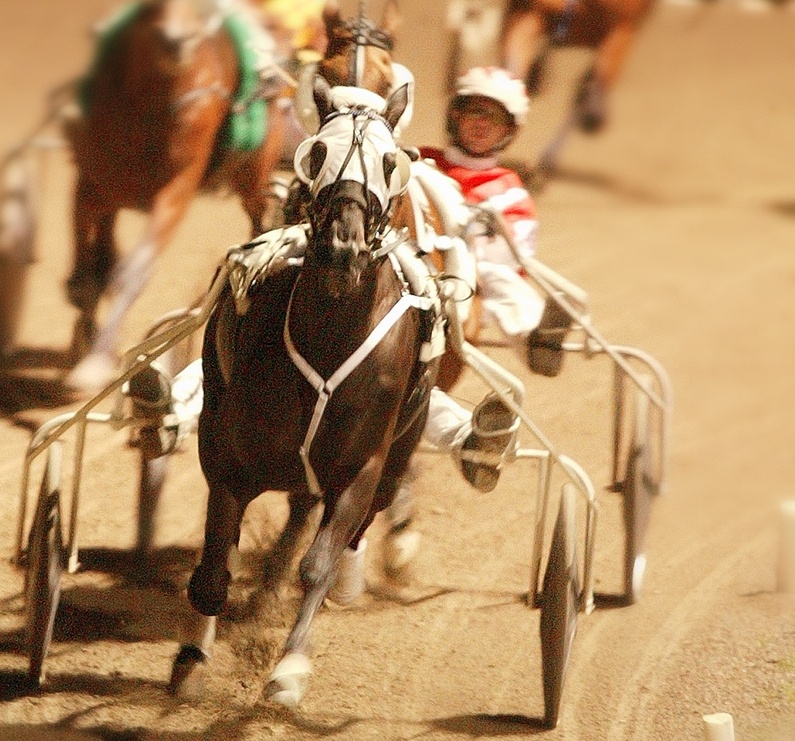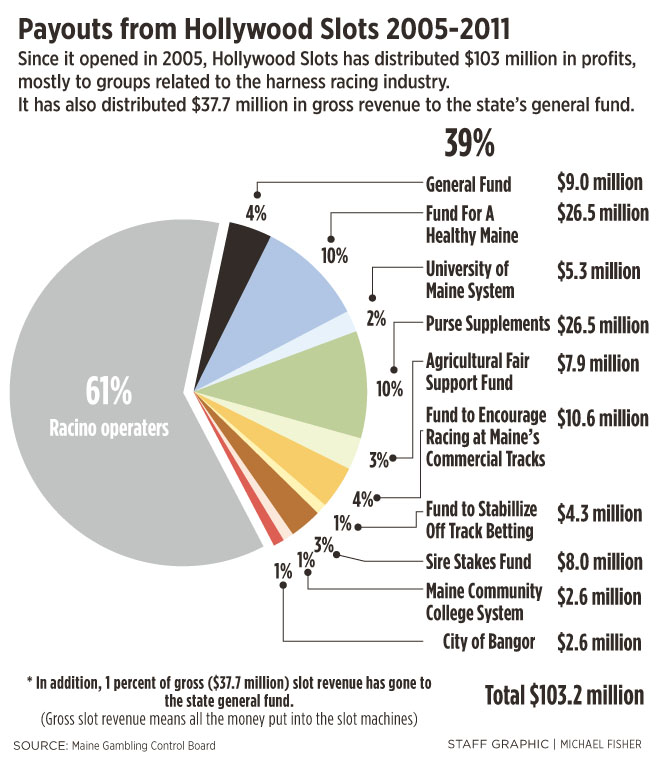Three years ago, when Peter Robinson and Stavros Mendros were drafting a citizens initiative to allow a casino in an empty mill building in downtown Lewiston, they decided the casino wouldn’t share its revenue with Maine’s harness racing industry. Maine’s horsemen were already getting millions of dollars annually from Hollywood Slots in Bangor, they figured.
Deciding that economic development would be their focus, they wrote a bill to dole out money to 30 groups, funding projects for rails, roads, ports, downtowns, energy-efficiency programs and river cleanup campaigns. Politically appealing programs, such as those that help the elderly, also made the list.
“If the Legislature doesn’t like it, they can strike everything out,” Mendros said in a recent interview. “But we put a lot of effort into getting the best bang for the buck for the state of Maine.”
Voters will decide whether that’s true when they vote Nov. 8 on Question 3, which would allow table games and slot machines in the former Bates Mill No. 5.
They also will decide the fate of Question 2, which would allow slot machines at harness racing tracks in Biddeford and Calais.
While Question 3 would divvy up gambling profits among numerous groups, Question 2 would allocate them primarily to the state’s harness racing industry.
Proponents of both ballot questions are extolling the revenue that they say their projects would generate for the state’s general fund and various programs. Opponents say that the whole process is flawed, and that Maine is missing an opportunity to make better use of gambling dollars.
Unlike in other states, where lawmakers decide how to spend gaming revenue, Maine is allowing casino developers to make the decisions, said Chris O’Neil, spokesman for Mainers Against a Rotten Deal, a group that’s opposing both ballot questions. As a result, the political calculation for winning a referendum has become the deciding factor for dispersing revenue.
“The casino developers are sprinkling around the money in strategic places for political gain,” O’Neil said. “That’s rare, if not unique, in the world of gaming regulations.”
GAMING BOON TO HARNESS RACING INDUSTRY
To date, the biggest recipient of Maine’s gambling revenue — other than the casino operators — has been the state’s harness racing industry.
Since it opened in 2005, Hollywood Slots has distributed more than $57 million in slot machine profits to the harness racing industry or groups related to it, such as agricultural fairs, and $48 million to the state’s general fund.
The infusion of slot revenue has boosted purses and encouraged horse owners to invest in faster horses. While the industry is now financially more stable, attendance and the amount of money wagered on harness racing have continued to decline.
The racinos proposed in Biddeford and Calais would send money to the harness racing industry in the same proportion as Hollywood Slots because the wording of the citizen-initiated bill is essentially the same as the law drafted for Hollywood Slots.
The state’s general fund would get 1 percent of the total amount poured into slot machines, as it does from Hollywood Slots.
After that, 39 percent of the net revenue — the money left after winnings are paid out — would go to 10 groups, primarily the harness racing industry, agricultural fairs and a drug program for senior citizens that’s run by the Fund for a Healthy Maine.
Proponents say it makes sense for horsemen to receive funding because a racino is essentially a partnership between two forms of gambling — slot machine parlors and racetracks.
HORSEMEN BOLSTERED HOLLYWOOD SLOTS
Hollywood Slots never would have been approved by voters if the harness racing industry hadn’t embraced it, said Denise McNitt, an equine veterinarian who keeps 30 horses on a farm in Cumberland.
McNitt said the partnership has saved two commercial tracks — Scarborough Downs and the Bangor Raceway — and one of Maine’s traditional industries. The equine industry, which includes racehorses and pleasure horses, employs 5,700 people, according to a 2007 study by Planning Decisions, a public-policy consulting firm based in South Portland.
“It’s not a subsidy like food stamps,” McNitt said of the slots money that goes to the harness racing industry and agricultural fairs. “It doesn’t come from tax dollars. It’s a business agreement.”
The partnership has paid off for racino developers as well. The argument that revenue from a racino would keep hayfields undeveloped and support a traditional Maine industry helped Hollywood Slots win voter approval in 2003. In the same election, voters rejected a casino proposed for Sanford by two Maine Indian tribes and a Las Vegas developer.
The partnership ensures that legislative hearings on racino issues are packed with plainspoken citizen-lobbyists — the people who breed, feed and care for racehorses.
Racino developers would get no political support without the backing of the harness racing industry, said Ernest Lowell, 65, of Saco, a blacksmith who shoes horses for a living.
“They wouldn’t be here without us,” he said, “and we wouldn’t be here without them.”
SKEPTICS QUESTION INDUSTRY SUBSIDIES
O’Neil said the way in which developers of gambling operations in Maine hand out revenue amounts to “willy-nilly political favoritism.”
While the harness racing industry is struggling, he said, so are fishermen and farmers. With its limited resources, he asked, why should an old-time industry that is fading in popularity be subsidized?
The developers of Lewiston’s casino would give money to the harness racing industry, but substantially less than the racinos in Biddeford and Calais — 0.5 percent of the profit, an estimated $243,000 a year.
That modest payout is intended to convince horsemen that the Lewiston project isn’t a threat to them, said Robinson, one of its backers.
“We are saying, ‘We respect what you are trying to do, and it’s OK, so here’s a little bit,’” he said.
Rather than give a large percentage of the money to any one industry, the developers would spread the money out in small amounts to many groups. The idea is to foster economic development but not become the main source of money for any one group, Robinson said.
The Lewiston developers didn’t consult with some of the groups on their list of potential beneficiaries. Although they hope those groups will support Question 3, they haven’t duplicated the political coalition that the harness racing industry and racino developers have formed.
For example, Wayne Davis, who heads TrainRiders/Northeast, a train advocacy group, is pleased that the Lewiston casino would generate a projected $2.5 million a year for rail improvements. But he said rail supporters are conservative by nature and wouldn’t necessarily support a casino simply because it would fund rail projects.
O’Neil said voters should reject both ballot questions so the Legislature can create a comprehensive plan for gambling operations, including how much they should be taxed and how the tax money should be spent.
“We need a rational process,” he said.
MaineToday Media State House Writer Tom Bell can be contacted 791-6369 or at:
tbell@mainetoday.com
Send questions/comments to the editors.




Success. Please wait for the page to reload. If the page does not reload within 5 seconds, please refresh the page.
Enter your email and password to access comments.
Hi, to comment on stories you must . This profile is in addition to your subscription and website login.
Already have a commenting profile? .
Invalid username/password.
Please check your email to confirm and complete your registration.
Only subscribers are eligible to post comments. Please subscribe or login first for digital access. Here’s why.
Use the form below to reset your password. When you've submitted your account email, we will send an email with a reset code.